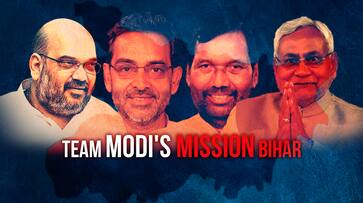The Lok Janshakti Party (LJP) of Ram Vilas Paswan that went into a pre-poll alliance with the Narendra Modi-led BJP in 2014, is likely to get 5 seats this time
The opposition is yet to set its house in order, leave aside start seat-sharing negotiations with potential allies, but the ruling Bhartiya Janata Party (BJP)-led National democratic Alliance (NDA) has already reached its seat-sharing agreement for the crucial State of Bihar that has 40 seats to offer.
Sources say the BJP, after a hard bargain, has agreed to fight from 20 seats in spite of the fact it has 22 sitting Lok Sabha MPs from the State. Nitish Kumar’s Janata Dal United (JDU), the source adds, will be given 12 seats to fight from Bihar and 1 additional seat to contest either from Jharkhand or Uttar Pradesh. As of now, the JD(U) has only two MPs in the Lok Sabha. These MPs are Santosh Kumar from Purnia and Kaushalendra Kumar from Purnia.
The Lok Janshakti Party (LJP) of Ram Vilas Paswan that went into a pre-poll alliance with the Narendra Modi-led BJP in 2014, is likely to get 5 seats this time. In 2014, the LJP fought from seven seats and won six. But political realities have changed ever since the JD(U) came back to the NDA fold, after which they had to be "accommodated respectably", as a leader puts it.
Another NDA ally RLSP, which has been acting pricey of late, has been told clearly that they won't get anything more than two seats. The suspended MP from the party, Arun Kumar, who has in a way split the party to BJP's delight, will fight as an NDA candidate, whether the RLSP stays with the NDA or leaves. If the RLSP chooses to leave 'Team Modi', one of the two seats earlier allotted to the RLSP will go to the LJP. The remaining one will come back to the BJP.
It’s a carefully crafted seat-sharing solution that has all the NDA allies in Bihar mutually agreeing to save the RLSP. But with a split in the party, little option is left for it than to stay within the NDA fold.
BJP president Amit Shah met all the party leaders individually before a meeting in Bihar where the final seat-sharing arrangement was chalked out.
Notably, the BJP has always had a higher conversion rate than the JD(U) throughout the elections that the two parties fought together, winning more out of the seats contested. However, the national party used to play the junior partner in the seat-sharing arrangement apparently because of better negotiation skills of Nitish Kumar's party. This has changed this time, with the BJP contesting in 50% of the seats available in Bihar while the JD(U) is contesting in remarkably fewer seats in the pre-poll seat-sharing formula.
Last Updated Aug 30, 2018, 6:37 PM IST









![Salman Khan sets stage on fire for Anant Ambani, Radhika Merchant pre-wedding festivities [WATCH] ATG](https://static-gi.asianetnews.com/images/01hr1hh8y86gvb4kbqgnyhc0w0/whatsapp-image-2024-03-03-at-12-24-37-pm_100x60xt.jpg)
![Pregnant Deepika Padukone dances with Ranveer Singh at Anant Ambani, Radhika Merchant pre-wedding bash [WATCH] ATG](https://static-gi.asianetnews.com/images/01hr1ffyd3nzqzgm6ba0k87vr8/whatsapp-image-2024-03-03-at-11-45-35-am_100x60xt.jpg)


